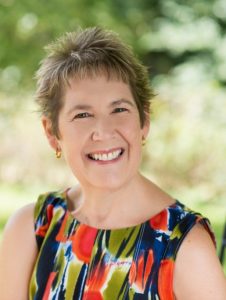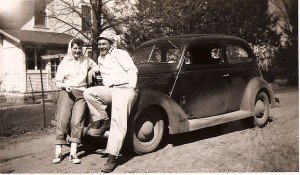
by jphilo | Feb 13, 2012 | Family

When Mom and I kept our standing lunch date last Tuesday, I mentioned that our next lunch would fall on Valentine’s Day. “That’s kind of fun, Mom. What would you like for Valentine’s Day?”
She thought for a few seconds. “Well, what I really want for Valentine’s Day I can’t have.” She fiddled with her coffee cup. “So I might as well not mention it.”
“Go ahead,” I encouraged her. “What do you really want?”
“What I really want is a few more years with your dad before his mind went…” She paused and moved her fingers in a circle at the side of her head. Her brow furrowed, and her blue eyes looked sad. “…you know, before he was…”
“I know,” I whispered.
“He wasn’t with me that way long enough,” Mom sighed.
I nodded, not knowing what to say. There are no words for Mom’s loss. Dad’s diagnosis of multiple sclerosis at age 29, less than 10 years after their marriage. The love of her life struck down by multiple sclerosis. The end of her dream of being the wife of a county extension agent and mother to an increasing brood of kids. The loss of the bread winner, the protector, and leader of the family she loved so much and taking on those roles for the next 38 years as Dad slowly failed and finally died at age 67.
Now, 15 years after his death, what does Mom want for Valentine’s Day?
Not chocolate.
Not flowers.
Not a card.
She wants a few more years with her husband as he once was.
I looked at her, across the table, and said, “We can’t know what life would have been like if he hadn’t gotten sick. But I do know the life you gave us was a good one. You raised us well.”
She nodded and smiled. “I did a pretty good job, didn’t I?”
“You did,” I agreed and helped her into her coat and out the door.
Hiram’s off tomorrow, so we’re going down together to see Mom. We’ll take her to lunch at Culver’s, one of her favorite places to eat. Mainly because she loves their frozen turtle custard.
Over dessert, we’ll tease her like Dad did. We’ll talk about his love of ice cream, his silly jokes, his infectious grin, the goofy songs he loved to sing, the cribbage rules he invented as he played.
Compared to what Mom has lost, lunch at Culvers doesn’t seem like much. But perhaps, sharing memories of Dad and indulging in the laughter and dessert he loved will bring him to her in some small way. Perhaps, over frozen custard, we can give Mom a memory of what she’s wanted for Valentine’s Day for years.
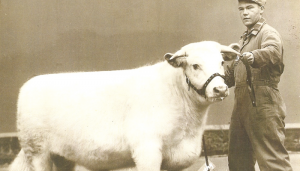
by jphilo | Oct 25, 2011 | Family

This past weekend was a walk down memory lane for me and three girl friends. We spent some of our time together catching up on decades of life since we graduated from high school in 19__. But mostly, we remembered the four years we were best friends, from the first day of ninth grade to the day we got our diplomas. Our parents figured largely in those memories, and since returning home, I’ve been thinking about and grateful for what we learned from our parents. So what better recycled column for today than one from October of 2007 about what my father taught me.
What Dad Taught Me – Recycled
On Monday, I went to a funeral for a man from our church. His children paid tribute to their dad during the service. He’d been a wonderful father, who took them hunting and fishing. He coached Little League, encouraging and teaching every child on the team. They mentioned that throughout their adult lives, when they reunited with childhood friends, their friends said hello and in the next breath, “How’s your dad?”
Maybe I shouldn’t confess this, but their memories saddened me. They reminded me of all my father couldn’t do with us. Don’t get me wrong. Dad was a vibrant man who loved children. He would have been a great Little League coach. And though he wasn’t a hunter or fisherman, he would have led our 4-H club. He would have taught us to raise, show and judge cattle because that was what he loved.
But he couldn’t do any of that because multiple sclerosis put him in a wheelchair when he was thirty, my sister was six, I was three and my brother was a baby. So I was sad at Monday’s funeral, not only for the family of the man who had died but also for what our family lost to Dad’s illness.
For the last few days, God has comforted me with truth. Over and over I’ve pictured Dad in his wheelchair while he lived at home or in his bed at the nursing home. And in every picture, his wide face is serious, even sad. Until one of his children or grandkids comes into his presence. Then his face breaks into a big grin that shows his square, white teeth and his green eyes light with delight.
And that is what Dad taught me: a father’s delight in the presence of his children. His delight didn’t come from what we could do for him. He was delighted because we were his children. We had taken time to be with him.
So now I’m thinking about God the Father. When I enter His presence, does His face light up? After all, I’m His child too.
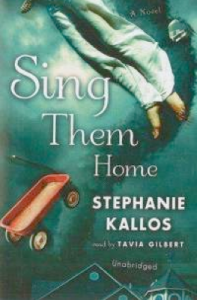
by jphilo | Mar 10, 2011 | Book Updates

Sing Them Home by Stephanie Kallos was an unknown entity when I picked the audio version at the library a few weeks ago. The large yellow sticker on the front of the audio CD case labeled it at 2011‘s All Iowa Read.
The plot summary on the back cover introduced Hope Jones, a woman swallowed by a tornado in the mid-1970s and alluded to her disappearance and it’s impact on the lives of her three children, even into adulthood. The Iowa/tornado connection was obvious, but when I took the book home and began listening, others emerged.
Hope and her family live in Emlyn Springs, a small, fictitious town with Welsh roots south of Lincoln, Nebraska. The town is a vibrant community when Hope and her physician husband, Llewellyn move there in the early 1960s. Over the years, Emlyn Springs follows the same slow decline of many small, Iowa towns, exacerbated by the farm crisis in the 1980s. By the early 2000s, Emlyn Springs, home of Fancy Egg Days, is struggling to survive.
The book had another, more personal connection. Hope Jones, mother of three, is diagnosed with multiple sclerosis (MS) when her children are young. At the heart of the book is the devastation wrought on Hope’s body and self-image, her marriage, and her children by the nasty, debilitating disease. It’s effects were a whirlwind of destruction, every bit as treacherous and confusing as the tornadoes that strike Emlyn Springs in 1978 and 2004.
How could I not compare and contrast the Jones family’s experience to our own?
Dad was diagnosed in 1958. Hope some years later.
Mom’s total, almost obsessive devotion to Dad. Llewellyn Jones pulling away from him.
The impact of the illness on Hope’s three children into adulthood. My siblings and I, also.
Emlyn Springs residents caring more than Hope realized. The same was true in our town.
The ways MS changed Hope’s personality. The ways it changed my father, too.
To be honest, I didn’t like Hope much by the end of the book. I didn’t like her response to the disease, even though I understood her reasons. Her multiplied devastation in her family. She was like someone who chooses to stand on the roof during a tornado instead of going to the basement. Sing Them Home bothered me. A lot. I found it too dark, too lacking in hope – ironic in light of the main character’s name. But I’m glad to have read it and wholeheartedly recommend it.
Why? Because it gives an accurate picture of small town, midwestern life. And once you’re read it, you will look at multiple sclerosis with new eyes. So I say, join all Iowa and read this book. Hopefully, it will bother you, too.
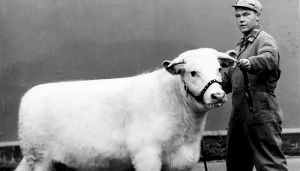
by jphilo | Jan 18, 2011 | Reflections on the Past

One look at the title of the blog entry originally posted in January of 2008, and I knew it would be this week’s recycled post. For the past three weeks, death has been on my mind. Not because someone is dying. Because I’m writing the section of Different Dream Parenting about death. Not just death, but the death and children. Not fun.
I feel like a hypocrite tackling the subject since both my children are living. But often while writing, and again today while reading through this old post, I find reassurance in my father’s life and my son’s early years. Those experiences taught me to think about death, and those thoughts are the foundation of what I’m writing now, as this recycled post shows.
Do You Ever Think About Death? – Recycled
“Do you ever think about death?” A friend asked the question in an email this morning. He thinks his son, who has been ill for a very long time, may be dying.
Yes, I told my friend, I think about death every day. It started when I was a kid, and I looked at pictures of my dad in his younger days – showing cattle, playing football, goofing around with his friends. That young man didn’t look like my dad. My dad sat in a wheelchair, weakened by multiple sclerosis. He grew weaker for thirty-eight years before his body died, but even as a kid, I knew that little bits of him died every single day.
When my son was born, my husband and I confronted death often. It almost tore me apart until God showed me the depths of His love for our baby, and I learned to hope in His promises.
Sure, I think of death every day. But I think a lot more about life when I face choices about what I believe and what I do based on my beliefs. Will I concentrate on the little bits of me that die every day or will I focus on the new life I receive? Will I fear death or love life? Will I ignore evidence of God at work in or will I acknowledge and submit to it?
As I think about death and life, the truth becomes clear. I can’t stop death. But I can choose to live in a way that honors the gift of life, the life God gave my father, the life he’s given my son, and the life of my friend’s child.
Every day, I think about death. But I choose hope.
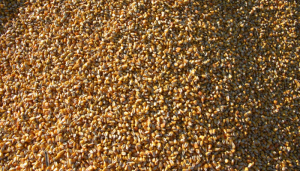
by jphilo | Oct 19, 2010 | Family

Ahhh…home again after two days of interviews and speaking engagements, two nights in strange beds, and two drives through the countryside where farmers were harvesting at full tilt. Though my eyelids are drooping and my body can’t wait to rest on our mattress’s familiar bumps and lumps, my heart is grateful for the people who made this quick trip a treasure of joy.
First, my cousin and his wife opened their home to me Sunday evening. Catching up on life with the adults was grand, but catching up on kid stuff with their children was a gold mine of information. I am now fluent in Thomas the Tank lingo, northwest Iowa youth tackle football league play-offs, downloading MP3 files, or the alphabet song – thanks to their three boys (ages 12, 10 & 5) and their 3-year-old daughter.
Monday yielded its own delights. The morning’s walking trail wound past a farmer combining corn and the local grain elevator with its growing pile of Iowa corn. Later in the day, the professionals and parents in the special needs community who agreed to be interviewed for my book shared nugget after nugget of wisdom. Then my daughter, her husband and I went out to dinner to celebrate his new job.
Which brings us to this morning when I spoke at a service club in my hometown, sharing childhood stories and memories of the people who helped our family after Dad was diagnosed with MS. Afterwards a friend of my parents spoke to me. “Every time I visited your dad,” he said, “I left with more than I had given. It was impossible to visit him and not leave smiling, feeling good.” We looked at each other, our eyes bright with tears.
Home again, reliving the memory, I wonder if this dear man knows what his words mean to me. They the assurance that my father’s life mattered, that he is remembered, that he gave more than he was given. His words are my golden treasure.
And I am grateful.






